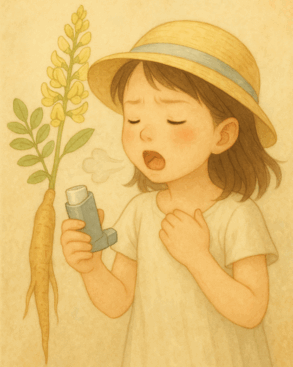Have you heard of Sophora root? It's a traditional Chinese medicinal herb that has recently demonstrated remarkable potential in scientific research. A Taiwanese research team has extracted a natural compound called Sophoraflavanone G (SG) from this herb, and early animal studies have shown—it may help alleviate asthma symptoms.的能力。
This research opens a promising new window of hope for asthma—a chronic condition that affects and troubles millions worldwide.
Ever wondered how annoying asthma can be?
Imagine trying to breathe, but feeling like no air is getting in. That’s what an asthma attack can feel like. It’s more than just shortness of breath—it can cause chest tightness, relentless coughing, and in severe cases, it can even become life-threatening.
Asthma is primarily caused by inflammation in the airways. When the immune system overreacts, the airways constrict and produce excess mucus, making it harder to breathe. Over time, this chronic inflammation can lead to structural changes in the airways that are difficult to reverse.
So, what did the research discover?
A research team from Chang Gung University of Science and Technology conducted a study using a mouse model of asthma. They administered the SG compound extracted from Sophora root, and the results were encouraging:
- It helped the mice breathe more easily.The mice also showed a significant reduction in airway hyperresponsiveness.
- Inflammation levels were also reduced.Both inflammatory cells and biomarkers associated with allergic responses showed a significant decrease.
- The immune response also appeared to be more balanced.It suppressed the overactive Th2 cells while enhancing the protective Th1 response.
- It also strengthened the antioxidant defense system.SG helped boost antioxidant enzymes in the lungs, which may reduce damage caused by free radicals.
These findings suggest that SG could potentially serve as an adjunct treatment option for asthma in the future.
But hold on — that doesn't mean you should rush out to buy Sophora root and start taking it.
Current research is still in its early stages.前期實驗階段The experiments have primarily been conducted in mice and at the cellular level, and have not yet progressed to human clinical trials.
In other words, while the effects are promising, they cannot yet be directly applied to human treatment.
Experts emphasize that until scientific research reaches the stage of clinical application, using Sophora root or its compounds without medical supervision could pose health risks. People should avoid relying on unproven remedies.
Conclusion: The Future Potential of Sophora Root
While more scientific validation is still needed, it offers a potential new direction—especially for asthma patients seeking natural complementary therapies.
Let us continue to follow the progress of science, and look forward to a future with more natural health options to help us breathe easier and live better.
This article is adapted based on the following research findings.
Wang M-C, Huang W-C, Chen L-C, et al. Sophoraflavanone G from Sophora flavescens ameliorates allergic airway inflammation by suppressing Th2 response and oxidative stress in a murine asthma model. International Immunopharmacology.Int. J. Mol. Sci. 2022, 23(11), 6104; https://doi.org/10.3390/ijms23116104
Feel free to share our research to help more people discover the potential of traditional herbal medicine and new directions in asthma treatment!
Please credit the original source when sharing, in respect of the researchers' hard work and contributions.










